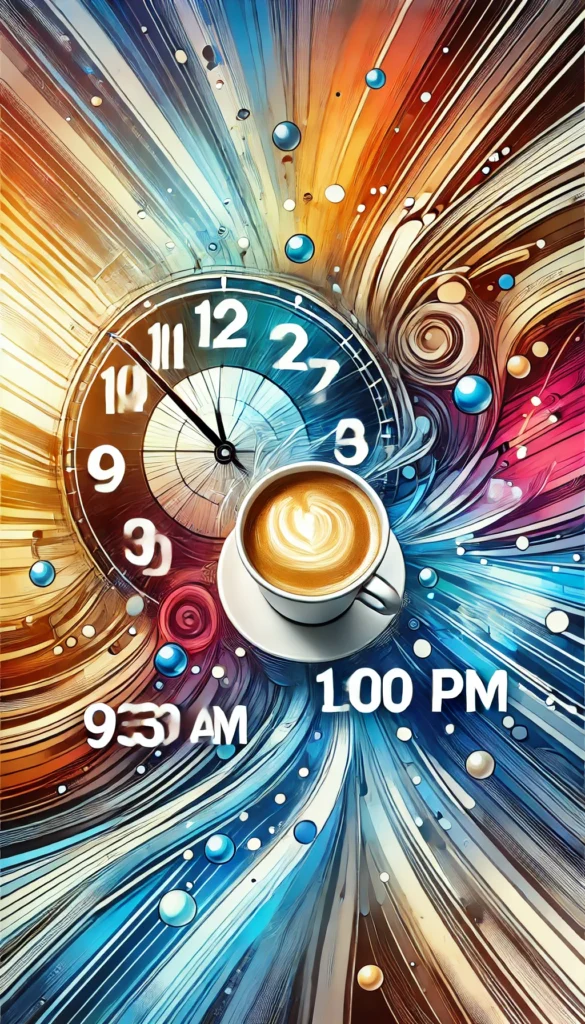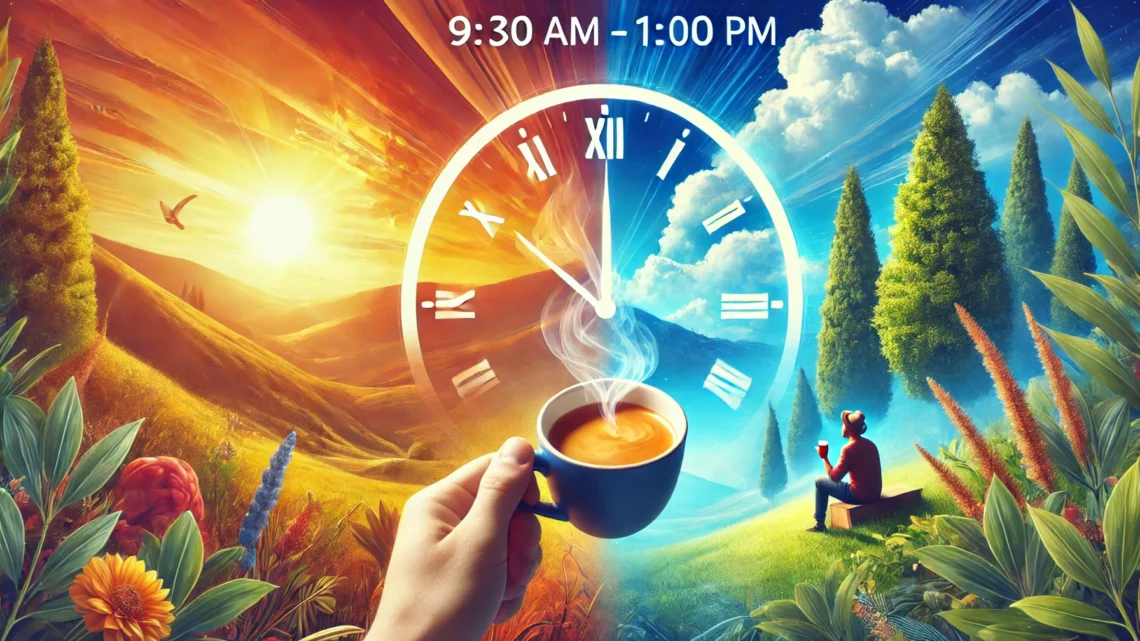Mastering the Best Time to Drink Coffee
For many of us, the day doesn’t truly start until that first cup of coffee. It’s a ritual that signifies the beginning of our daily hustle, providing a comforting moment of pause before the chaos ensues. But have you ever stopped to consider whether you’re drinking your coffee at the optimal time?
Timing, it turns out, is everything when it comes to coffee. Drinking it at the right moment can enhance its benefits, from boosting your alertness to improving your overall health. On the flip side, mistiming your coffee can lead to energy crashes or even disrupt your sleep patterns.
This article dives into the science of coffee timing. We’ll explore how your body’s natural rhythms, known as circadian rhythms, interact with caffeine and how you can use this knowledge to your advantage. By understanding when your body is most receptive to coffee, you can harness its full potential, making each cup more effective and beneficial.
So, before you reach for that second or third cup of the day, join us as we uncover the best times to enjoy your coffee, ensuring you get the most out of every sip. Whether you’re a morning person or a night owl, these insights could transform your coffee routine—and your day.
Understanding Your Body’s Natural Rhythms
To unlock the secret of the best time to drink coffee, we first need to understand our body’s natural rhythms, also known as circadian rhythms. These internal cycles regulate various physiological processes, including our sleep-wake cycle, hormone production, and energy levels throughout the day.
Circadian rhythms are like our body’s internal clock, ticking away in a roughly 24-hour cycle. They are influenced by external cues such as light and darkness, which signal to our brain when it’s time to wake up or wind down. This intricate system ensures that we feel alert during the day and sleepy at night.
One key player in this system is cortisol, often referred to as the “stress hormone.” Cortisol levels naturally peak in the morning, helping us wake up and feel alert. They gradually decrease throughout the day, reaching their lowest point at night. This natural rise and fall of cortisol are crucial for maintaining our daily energy balance.
When you drink coffee, the caffeine it contains interacts with these rhythms. Consuming caffeine at the wrong time can interfere with cortisol production, leading to diminished returns from your cup of joe. To maximize the benefits of coffee, it’s essential to align your intake with your body’s natural cycles.
By understanding and respecting your circadian rhythms, you can strategically time your coffee consumption to enhance alertness, boost productivity, and avoid unwanted energy crashes. In the next section, we’ll delve deeper into the science behind coffee and cortisol levels to pinpoint the optimal times for enjoying your favorite brew.
The Science Behind Coffee and Cortisol Levels
When we talk about the best time to drink coffee, it’s crucial to understand the role of cortisol in our bodies. Cortisol is a hormone produced by the adrenal glands, and it’s often referred to as the “stress hormone” because it’s released in response to stress. However, cortisol also plays a vital role in various bodily functions, including metabolism, immune response, and, importantly, our sleep-wake cycle.
In the morning, typically between 6:00 and 8:00 AM, our cortisol levels are naturally high. This surge is part of what helps us wake up and feel alert. The body’s natural energy boost at this time means that adding caffeine into the mix may not be as effective, as your body is already at its peak alertness. Essentially, drinking coffee during this period can be redundant and less impactful.
Cortisol levels then dip and rise again in cycles throughout the day. The next significant increase occurs around lunchtime and then again in the late afternoon. If you drink coffee when your cortisol levels are already elevated, it can lead to an unnecessary increase in cortisol production, which can contribute to increased tolerance to caffeine over time and a less effective energy boost.
The optimal time to drink coffee, therefore, is when your cortisol levels are lower. This is usually mid-morning, between 9:30 and 11:30 AM, and in the early afternoon, from 1:00 to 3:00 PM. During these windows, your body is not naturally producing as much cortisol, so the caffeine can give you the desired boost in alertness and productivity.
By timing your coffee consumption with these natural fluctuations, you can maximize its benefits, avoid building a tolerance too quickly, and prevent unnecessary stress on your adrenal glands. In the following sections, we’ll explore how you can personalize your coffee drinking schedule to fit your lifestyle and needs, ensuring you get the most out of every cup.
Best Times to Drink Coffee
Now that we understand the interplay between caffeine and cortisol, let’s pinpoint the best times to drink coffee to maximize its benefits. Remember, the goal is to align your coffee intake with the natural dips in your cortisol levels.
Mid-Morning (9:30 – 11:30 AM)
The period between 9:30 and 11:30 AM is often considered the sweet spot for your first cup of coffee. By this time, the initial cortisol peak has subsided, and your body is naturally starting to experience a slight dip in alertness. Drinking coffee during this window can provide the perfect caffeine boost to keep you energized and focused as you transition from morning tasks to midday activities.
During these mid-morning hours, caffeine can enhance cognitive function, improve concentration, and help you power through any lingering morning sluggishness without the risk of interfering with your natural cortisol production.
Early Afternoon (1:00 – 3:00 PM)
Another optimal time for coffee is in the early afternoon, from 1:00 to 3:00 PM. This period often coincides with the post-lunch slump, a common time when people experience a natural dip in energy levels and alertness. A well-timed cup of coffee can combat this fatigue, helping you stay productive and alert during the second half of your workday.
Drinking coffee in the early afternoon can help you maintain a steady level of energy and focus, making it easier to tackle afternoon tasks and meetings with a clear mind. It’s important, however, to avoid drinking coffee too late in the afternoon, as caffeine can stay in your system for several hours and may interfere with your sleep if consumed too late.

Personalizing Your Coffee Drinking Schedule
While these general guidelines can help you determine the best times to drink coffee, it’s essential to consider your individual lifestyle, work schedule, and sleep patterns. For instance, if you wake up earlier or later than the average person, you may need to adjust these times accordingly. Similarly, if you have a unique work schedule or experience energy dips at different times, personalize your coffee intake to match those patterns.
Experiment with different timings to see what works best for you. Pay attention to how your body responds to coffee at various times of the day and adjust your routine accordingly. By doing so, you can find the perfect coffee schedule that aligns with your natural rhythms and enhances your overall productivity and well-being.
In the next section, we’ll explore the specific health benefits of timing your coffee intake correctly, from improved alertness to better sleep quality.
Health Benefits of Timing Your Coffee Intake
Timing your coffee consumption strategically can offer a range of health benefits that go beyond just keeping you awake. Let’s explore some of these advantages in detail.
Enhanced Alertness and Productivity
When you drink coffee during the optimal windows of mid-morning and early afternoon, you can enhance your alertness and productivity more effectively than if you consume it when your cortisol levels are naturally high. This precise timing ensures that the caffeine works in harmony with your body’s natural energy cycles, giving you a significant boost when you need it most. By aligning your coffee intake with these periods, you can improve your focus, cognitive function, and overall work performance.
Improved Sleep Quality
One of the main concerns with caffeine is its potential to disrupt sleep patterns. Drinking coffee too late in the day can interfere with your ability to fall asleep or achieve deep, restorative sleep. By limiting your coffee consumption to earlier in the day, specifically avoiding it in the late afternoon and evening, you can prevent caffeine from impacting your sleep. This approach helps maintain a healthy sleep schedule, which is crucial for overall well-being and long-term health.
Potential Metabolic Benefits
Research suggests that caffeine can have positive effects on metabolism, including increased fat oxidation and improved insulin sensitivity. Timing your coffee intake to coincide with your body’s lower cortisol periods can help maximize these metabolic benefits. For example, consuming coffee in the mid-morning can aid in managing blood sugar levels more effectively and support weight management efforts.
Reduced Risk of Caffeine Tolerance
When you drink coffee during times of naturally high cortisol levels, your body may build up a tolerance to caffeine more quickly. This tolerance means you would need more coffee to achieve the same level of alertness over time, which can lead to excessive caffeine consumption and its associated side effects. By drinking coffee at times when your cortisol levels are lower, you can reduce the risk of developing a high tolerance, allowing you to enjoy the stimulating effects of caffeine without needing to increase your intake continually.
Balanced Energy Levels
Strategically timing your coffee consumption can help you maintain balanced energy levels throughout the day. Rather than experiencing dramatic peaks and crashes in your energy, well-timed coffee intake can provide a steady stream of alertness, reducing the likelihood of afternoon slumps or reliance on multiple cups of coffee to get through the day. This balance supports sustained productivity and overall mood stability.
In the upcoming section, we will address some common myths about coffee timing and debunk misconceptions that may have influenced your coffee-drinking habits. By separating fact from fiction, you can make more informed decisions about when to enjoy your favorite beverage.
Common Myths About Coffee Timing
There are many myths and misconceptions about the best times to drink coffee. Let’s debunk some of the most common ones to help you make more informed decisions about your coffee habits.
Myth 1: Drinking Coffee First Thing in the Morning is Best
Many people believe that drinking coffee immediately after waking up is the best way to start the day. However, as we’ve discussed, this is when your cortisol levels are naturally high. Adding caffeine at this point can reduce its effectiveness and potentially increase your tolerance. Instead, wait until mid-morning when your cortisol levels begin to dip, allowing the caffeine to have a more pronounced effect.
Myth 2: Afternoon Coffee Ruins Your Sleep
While it’s true that drinking coffee too late in the day can interfere with sleep, the early afternoon window (1:00 – 3:00 PM) is generally safe for most people. During this time, you can benefit from an energy boost without the caffeine staying in your system long enough to disrupt your nighttime sleep. However, it’s important to know your own body’s sensitivity to caffeine and adjust accordingly.
Myth 3: More Coffee Equals More Energy
Some believe that drinking more coffee will continuously boost energy levels. In reality, excessive caffeine intake can lead to jitters, anxiety, and a subsequent energy crash. It’s more effective to time your coffee consumption strategically rather than increasing the quantity. Quality and timing trump quantity when it comes to maximizing coffee’s benefits.
Myth 4: Coffee Should Be Avoided for Better Health
There’s a persistent myth that coffee is generally bad for health. In moderation and when consumed at the right times, coffee can offer several health benefits, including improved metabolism, enhanced cognitive function, and reduced risk of certain diseases. The key is to consume it mindfully and in alignment with your body’s natural rhythms.
Myth 5: Decaf Coffee is Completely Caffeine-Free
While it’s true that decaf coffee contains significantly less caffeine than regular coffee, it’s not completely caffeine-free. If you’re highly sensitive to caffeine, even decaf can impact your sleep if consumed too late in the day. Be mindful of your total caffeine intake from all sources, not just regular coffee.
Practical Tips for Optimal Coffee Consumption
Armed with the knowledge of when and how to drink coffee, here are some practical tips to integrate these insights into your daily routine:
- Morning Routine: Start your day with a glass of water or a light breakfast to hydrate and energize your body naturally. Hold off on your first cup of coffee until mid-morning.
- Mid-Morning Boost: Enjoy your first cup of coffee between 9:30 and 11:30 AM to take advantage of the natural dip in cortisol and enhance your alertness.
- Early Afternoon Pick-Me-Up: If you need an additional boost, have a second cup between 1:00 and 3:00 PM. Avoid coffee later in the afternoon to prevent sleep disruption.
- Stay Hydrated: Balance your coffee intake with plenty of water throughout the day to stay hydrated and support overall health.
- Listen to Your Body: Pay attention to how your body responds to coffee at different times and adjust your routine accordingly. Everyone’s tolerance and sensitivity to caffeine are unique.
By implementing these tips, you can make the most out of your coffee consumption, ensuring it enhances your productivity, health, and overall well-being.
In the final section, we’ll summarize the key points and encourage you to experiment with your coffee timing to discover what works best for you.
Optimize Your Coffee Routine for Maximum Benefits
Timing your coffee intake strategically can have a significant impact on your daily energy levels, productivity, and overall health. By aligning your coffee consumption with your body’s natural rhythms, particularly your cortisol cycles, you can maximize the benefits of caffeine while minimizing potential downsides such as tolerance and sleep disruption.
To recap:
- Drink your first cup of coffee mid-morning, between 9:30 and 11:30 AM, to coincide with the natural dip in cortisol levels.
- Enjoy a second cup in the early afternoon, between 1:00 and 3:00 PM, to counteract the post-lunch energy slump.
- Avoid drinking coffee late in the afternoon and evening to prevent interference with your sleep.
Experiment with these timings and adjust based on your unique lifestyle and body’s responses. By doing so, you can create a coffee routine that supports your energy needs throughout the day and enhances your overall well-being.
Optimize Your Coffee Routine for Maximum Benefits
For more health tips and to optimize your daily habits, be sure to visit our blog regularly. Stay tuned for more insights into how you can live a healthier, more energized life.
Explore more health tips and optimize your daily habits by visiting our blog regularly. Stay informed and make the most of your coffee routine!
FAQs: Coffee Timing and Consumption
Q1: Why shouldn’t I drink coffee first thing in the morning?
A: Drinking coffee first thing in the morning can be less effective because your cortisol levels are naturally high at that time. Adding caffeine can interfere with cortisol production and reduce the overall impact of the caffeine. It’s better to wait until mid-morning when your cortisol levels dip.
Q2: Can drinking coffee in the afternoon affect my sleep?
A: Yes, drinking coffee too late in the afternoon or evening can interfere with your sleep because caffeine stays in your system for several hours. To avoid sleep disruption, it’s best to have your last cup of coffee in the early afternoon, between 1:00 and 3:00 PM.
Q3: How can I tell if I’m drinking too much coffee?
A: Signs of excessive coffee consumption include jitteriness, anxiety, digestive issues, and trouble sleeping. If you experience these symptoms, consider reducing your intake and monitoring how your body responds.
Q4: Is decaf coffee a good alternative in the afternoon?
A: Decaf coffee can be a good alternative if you crave the taste of coffee in the afternoon but want to avoid the stimulating effects of caffeine. However, keep in mind that decaf coffee still contains a small amount of caffeine, which can affect some people.
Q5: How can I adjust my coffee intake to match my unique schedule?
A: Pay attention to your energy levels throughout the day and experiment with different times for drinking coffee. Note when you feel naturally alert and when you experience dips in energy. Adjust your coffee consumption to align with these patterns, ensuring it enhances your productivity and well-being without disrupting your sleep.

